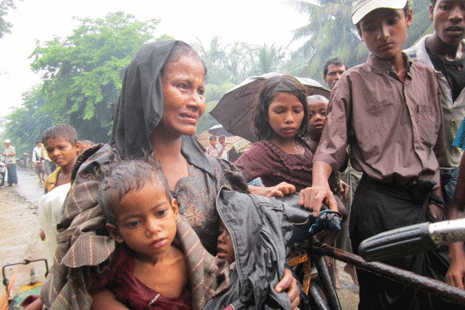
After a week of unprecedented violence, the Rohingya people face further upheaval and a future that is possibly more uncertain than at any time in their recent turbulent past. Last week's hostilities in several parts of Rakhine state killed at least 88 people and forced around 28,000 out of their homes. While the fighting is reported to have subsided in the key conflict zones, diplomatic developments have brought no good news. Bangladesh yesterday told Myanmar to deal with any displaced Rohingyas, saying its doors will remain closed to refugees trying to cross its borders. Foreign minister Dipu Moni said the Myanmar authorities should ensure the security and safety of its people. “We need to make sure that the Rohingya issue in Myanmar doesn’t create problems for Bangladesh,” she said. Moni’s comments came as the UN also appealed to Bangladesh to open its borders to people fleeing the latest violence. Dhaka says it has experienced repeated influxes of Rohingyas from Rakhine state due to clashes dating back to 1991 but cannot take anymore. Over the weekend Bangladeshi authorities sealed the south eastern border in the Cox’s Bazar district, pushing back more than 50 refugees and preventing a further 3,000 from crossing the Naf River, the maritime boundary, in fishing boats. “According to directives from the government we are on high alert to bar entry to Rohingya refugees. We just can’t let them in,” said Ruhul Amin, a district administrator in Cox’s Bazar. Meanwhile, Surin Pitsuwan, Secretary-General of the Association of Southeast Asian Nations (ASEAN) warned that the Rohingya issue could destabilize the Southeast Asia region. “They [the Rohingyas] are now under tremendous pressure, pain and suffering. If the international community, including ASEAN, are not able to relieve that pressure and pain, conceivably, [they] could become radicalized [by terrorists] and the entire region could be destabilized, including the Malacca Straits,” he said yesterday in Jakarta. He added that the Malacca Straits has become one of the most important economic factors in the Southeast Asia region. This sea-lane serves as the main shipping channel between the Indian and Pacific Oceans, linking major Asian economies such as India, China, Japan and South Korea. “The thing to do is to approach with humanity, to release them from the shackles of poverty, dislocation and displacement by force,” he continued. However, he echoed the Bangladesh Foreign Minister's words when he said the Myanmar government must settle its security, political, human rights and democracy issues. He saw the Rohingya issue not as a religious conflict between Muslims and Buddhists. “It is strategic and security issue," he said. "We have to be extremely careful.” Related reports At least 20,000 displaced in one weekDemands grow to lift NGO refugee ban


